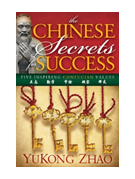In a recent interview, Fareed Zakaria, the host of CNN Global Public Square asked Tiger Mom, Amy Chua and her husband, Mr. Rubenfeld’s: How do you explain the phenomena that Chinese and Indians are doing very well in the U.S. but China and India still lag behind the U.S.? This is an unanswered question that perplexed many readers of Tiger Mom’s new book The Triple Packages: How Three Unlikely Traits Explain the Rise and Fall of Cultural Groups in America. Actually, I was also faced with the very same question when I wrote my book, The Chinese Secrets For Success: Five Inspiring Confucian Values.
To address this question, we need understand that the factors that drive a nation’s success are largely different from those that drive individual and family success, though a few factors drive successes of both a nation and a person, for example, education. By understanding the difference, we can explain why Chinese Americans succeed in the U.S. while China still lags behind the U.S.
A nation’s success depends on its political, economic and social systems. They were built upon many wisdoms and cultural values in human history. For example, ancient philosopher Aristotle wrote “Law should govern.” French Enlightenment political philosopher Baron de Montesquieu proposed of the separation of political power among a legislature, an executive, and a judiciary. The free market system was championed by British scholar, Adam Smith. Opposing views include Italian Fascism and Japanese Militarism which led to disasters in human history. It is the better political, economic and social systems that help create a better country.
In fact, ancient China had one of the most advanced political, economic and social systems for more than one thousand years. Influenced by Confucian values, Chinese emperors were asked to put people’s interests first. While the rest of world selected their ruling classes by nobility or family origins, China already selected their administrators by virtue and knowledge, using a nationwide imperial examination system which was open to anybody, regardless of family or social status. Confucian pro-education culture also facilitated China’s economic development and technological innovation. In the Song Dynasty (960-1279), China reached its peak of civilization. Its economy took up more than 50% of world’s GDP and Song was the world leader in commerce, banking, manufacturing and technological innovation.
Unfortunately, the Song Civilization was brutally destroyed by Mongol invaders in later 13th century. The later Dynasties, Yuan (ruled by Mongol invaders), Ming and Qing (ruled by Manchu invaders) adopted barbaric political and economic systems which put the ruler’s (not people’s) interests first. They also discouraged industrial development, commerce and forbade international trade. As a result, Chinese civilization was reversed and stagnated.
When China stopped her economic development and technological innovation, the West was moving forward with the enlightenment, industrial revolution and establishment of capitalism. The West surpassed China with its modern political and economic systems: Rule of law, free market system, equal rights and democracy. It is best represented by the United States, which has developed as the most economically, technologically, militarily powerful nation on the earth since World War II.
Though China has started adopting many essential elements of modern political and economic systems, such as free market economy and rule of law, it has not yet completed its journey to build a modern governing system. This explains why China is not as advanced as the US yet. Most of China’s serious challenges such as corruption, pollution and food safety have something to do with its weakness in its political and economic systems, not with its personal and family development culture.
Personal and family success depends on a set of cultural values that are related to personal or family development. They include how a society and individuals view education, family, money management, and morality. In this area, Confucian values illustrate many strengths. Lizhi inspires everyone to have a big dream for their lives, motivating people to work hard and succeed. Qinxue emphasizes education and enables people to pursue a rewarding career. Jiejian advocates people save money and build their financial security wisely. Gujia teaches people how to create a loving and successful family. Zeyou stresses good moral values and advises people to select beneficial friendships.
Blessed by their cultural heritage—Confucian values, Chinese Americans and other Asian Americans with an East Asia origin are able to deflect many undesirable influences in American society: consumerism/over-spending, anti-intellectualism and worship of celebrities from pop culture, to become part of the highest-income, best-educated racial group in the US, according to a 2012 Pew Research Center Report. Many researches have also proved that Chinese/Asian Americans manage their money and family better, resulting in a higher saving rate and lower rates of divorce, crime and obesity.
As I put in the introduction of my book, “After the Chinese immigrated to the U.S., they embraced and benefited from many important Western values such as rule of law, equal rights and independent thinking. At the same time, they retained much of their own cultural heritage, predominantly Confucian values, such as the emphasis on education, saving and devotion to the family. It is the combination of positive values drawn from both Confucianism and Western culture that make many Chinese/Asian Americans successful in their pursuit of the American Dream!”
In summary, it is the weakness of the Chinese political and economic systems that makes China lag behind the U.S. On the other hand, it is the inspiring of Confucian values on personal and family development that helps Chinese Americans succeed in the U.S.
This blog was first published on March 3, 2014 on ChineseSecretsforSuccess.com.



